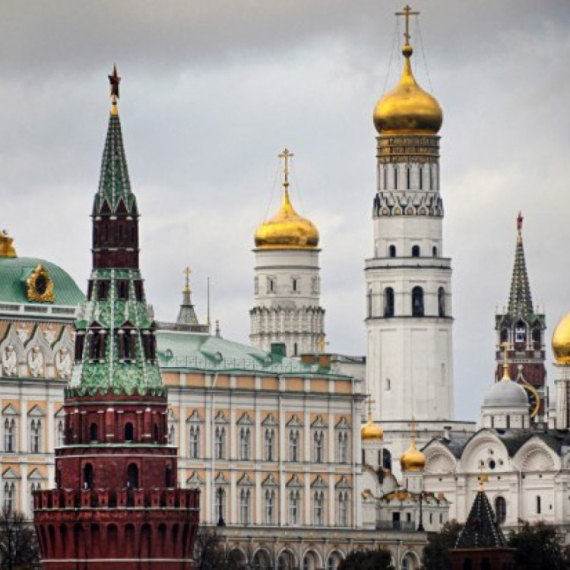Presidents open Greek cultural center
Serbian and Greek Presidents Boris Tadić and Karolos Papoulias have opened a Hellenic Culture Fund Center that they hope will strengthen bilateral ties.
Saturday, 04.07.2009.
09:24

Serbian and Greek Presidents Boris Tadic and Karolos Papoulias have opened a Hellenic Culture Fund Center that they hope will strengthen bilateral ties. Belgrade has received a place where Greek tradition, culture and language will be promoted. Presidents open Greek cultural center According to the center’s president, it will house common elements of the two countries’ cultures, with the active participation of Serbian artists. It was precisely this historical bond between the two peoples that the Serbian and Greek presidents highlighted. “Deeply believing in the origin of European culture here in the Balkans, in our common space, obviously, above all, on the territory of Greece, I believe that such acts of opening cultural institutions only contribute to our common European future,” said Tadic. “I also believe that Serbia and Greece are not just a common history but a common future,” said the Serbian president. “This center will bolster the profound historical and cultural ties between the Greek and Serbian peoples. I believe that the vision of Rigas Konstantinos can be realized. I believe in forming a Balkan core within the EU where Serbia rightfully belongs, because of its history, culture and geographical position,” said Papoulias. The center was opened with an exhibition titled “Stolen History”, devoted to the sale of antiquities stolen from Mediterranean countries by auction houses in the U.S. Serbia is the fourth country in the Balkans to open a Helsinki Culture Fund Center after Romania, Bulgaria and Albania. Papoulias, Tadic (FoNet) Greek president meets with Serbian leadership Following talks yesterday with Greek President Karolos Papoulias, PM Mirko Cvetkovic said that relations between the two countries were “exceptionally good." He also voiced his appreciation to the Greek president for his support to Serbia’s EU integration and Serbia’s efforts to preserve its territorial integrity and sovereignty and to defend the principles of international law in Kosovo. Cvetkovic thanked Papoulias for “Greece’s systematic support for Serbia’s EU integration and Greece’s principled stand and support for the preservation of Serbia’s territorial integrity and sovereignty,” read a statement from the government. The prime minister said that good bilateral relations between the two countries were primarily based on traditional friendship and the Balkan alliance between Serbian and Greek people. They agreed at the meeting that economic cooperation could be further improved, as well as the volume of trade. Speaker Slavica Djukic-Dejanovic earlier discussed with Papoulias political and economic relations between the two countries, and further intensification of parliamentary cooperation. Papoulias offered his full support to Serbia’s EU integration and voiced his belief that the EU visa regime with Serbia would be liberalized by the end of the year, the speaker’s cabinet announced after the meeting with Papoulias in the National Parliament. Voicing his full support for Serbia’s attempts to preserve its sovereignty and territorial integrity , the Greek president stressed the need to uphold the rights of the Serb minority, and the preservation of Serbian cultural heritage in Kosovo. Djukic-Dejanovic thanked Papoulias for Greece’s stand on Kosovo, stating that it was vital that the issue of resolving Kosovo’s status had been moved out of a political framework into that of international law.
Presidents open Greek cultural center
According to the center’s president, it will house common elements of the two countries’ cultures, with the active participation of Serbian artists.It was precisely this historical bond between the two peoples that the Serbian and Greek presidents highlighted.
“Deeply believing in the origin of European culture here in the Balkans, in our common space, obviously, above all, on the territory of Greece, I believe that such acts of opening cultural institutions only contribute to our common European future,” said Tadić.
“I also believe that Serbia and Greece are not just a common history but a common future,” said the Serbian president.
“This center will bolster the profound historical and cultural ties between the Greek and Serbian peoples. I believe that the vision of Rigas Konstantinos can be realized. I believe in forming a Balkan core within the EU where Serbia rightfully belongs, because of its history, culture and geographical position,” said Papoulias.
The center was opened with an exhibition titled “Stolen History”, devoted to the sale of antiquities stolen from Mediterranean countries by auction houses in the U.S.
Serbia is the fourth country in the Balkans to open a Helsinki Culture Fund Center after Romania, Bulgaria and Albania.
Greek president meets with Serbian leadership
Following talks yesterday with Greek President Karolos Papoulias, PM Mirko Cvetković said that relations between the two countries were “exceptionally good."He also voiced his appreciation to the Greek president for his support to Serbia’s EU integration and Serbia’s efforts to preserve its territorial integrity and sovereignty and to defend the principles of international law in Kosovo.
Cvetković thanked Papoulias for “Greece’s systematic support for Serbia’s EU integration and Greece’s principled stand and support for the preservation of Serbia’s territorial integrity and sovereignty,” read a statement from the government.
The prime minister said that good bilateral relations between the two countries were primarily based on traditional friendship and the Balkan alliance between Serbian and Greek people.
They agreed at the meeting that economic cooperation could be further improved, as well as the volume of trade.
Speaker Slavica Đukić-Dejanović earlier discussed with Papoulias political and economic relations between the two countries, and further intensification of parliamentary cooperation.
Papoulias offered his full support to Serbia’s EU integration and voiced his belief that the EU visa regime with Serbia would be liberalized by the end of the year, the speaker’s cabinet announced after the meeting with Papoulias in the National Parliament.
Voicing his full support for Serbia’s attempts to preserve its sovereignty and territorial integrity , the Greek president stressed the need to uphold the rights of the Serb minority, and the preservation of Serbian cultural heritage in Kosovo.
Đukić-Dejanović thanked Papoulias for Greece’s stand on Kosovo, stating that it was vital that the issue of resolving Kosovo’s status had been moved out of a political framework into that of international law.
















Komentari 26
Pogledaj komentare